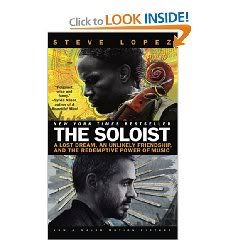The Soloist
In a neglected corner of L.A.'s Pershing Park stands a statue of Beethoven, hat and cane clasped behind his back. The minute Nathaniel Anthony Ayers laid eyes on it, he knew he'd landed in the right city. Los Angeles. The City of Beethoven.
Ayers, in his mid-50s, is a Julliard-trained bass player whose future as a musician crashed and burned when he suffered a psychotic breakdown midway through his studies in the early 1970s. The crack-up was probably prompted by the intensely competitive Julliard atmosphere, but also by the stressful fact that Ayers was a black student on a nearly all-white campus. His professors thought him brilliant. But with the onset of mental illness (later diagnosed as paranoid schizophrenia), Ayers dropped out of sight. Years later, he wound up in Los Angeles, discovered the statue of Beethoven (his musical hero), and settled down to a life in the streets where he serenaded passing traffic on a battered, two-stringed violin. Music was the abiding passion that kept him grounded. Music was the catalyst that brought beauty and peace to his frequently confused and always fragile world.
One day Steve Lopez, columnist for the "L.A. Times" and an engaging, insightful author, heard Ayers playing. Sensing a column topic, he struck up an acquaintance. The acquaintance unexpectedly blossomed into a friendship, and The Soloist is the story of that friendship. Lopez's sensitive memoir spotlights the disorientation of schizophrenia, the perils of living on the streets, and the difficulty in achieving recovery. But in telling Ayers' story, Lopez also reminds us that the mentally ill and the homeless possess dignity, a fierce need for autonomy, and a hunger for meaning and beauty in their lives. In the process, Lopez also has some telling things to say about the scandalous fact that most major U.S. cities contain Skid Rows in which the most vulnerable of our citizens are segregated; some much-needed observations, given our pharmaceutical-crazy, quick-cure ethos, about patience, respect, and compassion when it comes to therapy (his mentor in this regard is Dr. Mark Ragins, a genuine pioneer in recovery therapy); and some extraordinarily important things to say about the redemptive power of music.
Lopez's memoir of his friendship with Ayers never falls into a feel-good sentimentality. Ayers may heal to a certain extent, but it's unlikely that he'll ever recover and he certainly has his bad, disoriented, full-of-rage days. As Lopez learned, progress in treating mental illness is never linear. But Ayers now lives in an apartment instead of on the street; he's happily making music on a variety of instruments in his own studio; and he knows that he's loved. Lopez, in turn, confesses that he frequently felt burdened, helpless, frustrated, and on one occasion when Ayers melted down, betrayed. But he also discovered that his friendship with Ayers enriched him: "I know that through [Ayers'] courage and humility and faith in the power of art--through his very ability to find happiness and purpose--he has awakened something in me...it's not a stretch to say that this man I hoped to save has done as much for me as I have for him" (p. 268).
A magnificent story about two really quite extraordinary men. Highly, unreservedly, recommended.
Labels: best books, new york best seller, The Soloist


